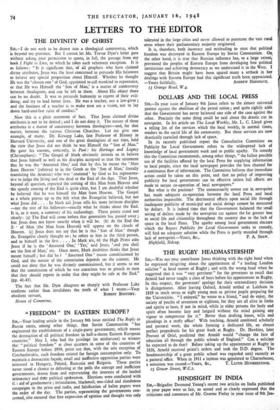THE RUGBY HEADMASTERSHIP
Sta,—Was not contributor Janus thinking with the right head when
he eipreSsed misgiving about the appointment of " a leading London solicitor " as head master of Rugby ; and with the wrong head when he suggeSted that it was " very pertinent" for the governors to recall that Arnold had never taught a class of boys before his appointment to Rugby. In this respect, the governors' apology for their extraordinary decision is disingenuous. After leaving Oxford, Arnold settled at Laleham in 1819 to teach seven or eight young men as private pupils preparing for the Universities. " I enjoyed," he wrote to a friend, " and do enjoy, the society of youths of seventeen or eighteen, for they are all alive in limbs and spirits at least, if not in mind, while in older persons the body and spirit often become lazy and languid without the mind gaining any vigour to compensate for it." Better than drafting leases, wills and pleadings in a stuffy office! With teaching, Arnold combined scholarly and pastoral work, the whole forming a dedicated life, an almost perfect propedeutic for his great work at Rugby. Dr. Hawkins, later Provost of Oriel, predicted that Arnold would "change the face of education all through the public schools of England." Can a solicitor be expected to do that? Before taking up the appointment at Rugby in 1828, Arnold received priest's orders and took the D.D. degree. The headmastership of a great public school was regarded until recently as a pastoral office. When in 1911 a layman was appointed to Charterhouse,
a sensation was caused.—Yours, &c., T. LLOYD HUMBERSTONE. rs Gower Street, W.C.i.


































 Previous page
Previous page